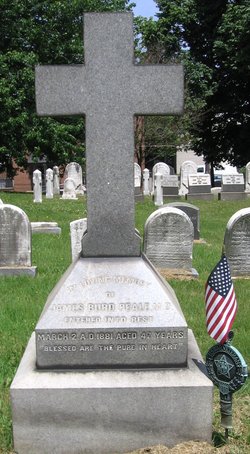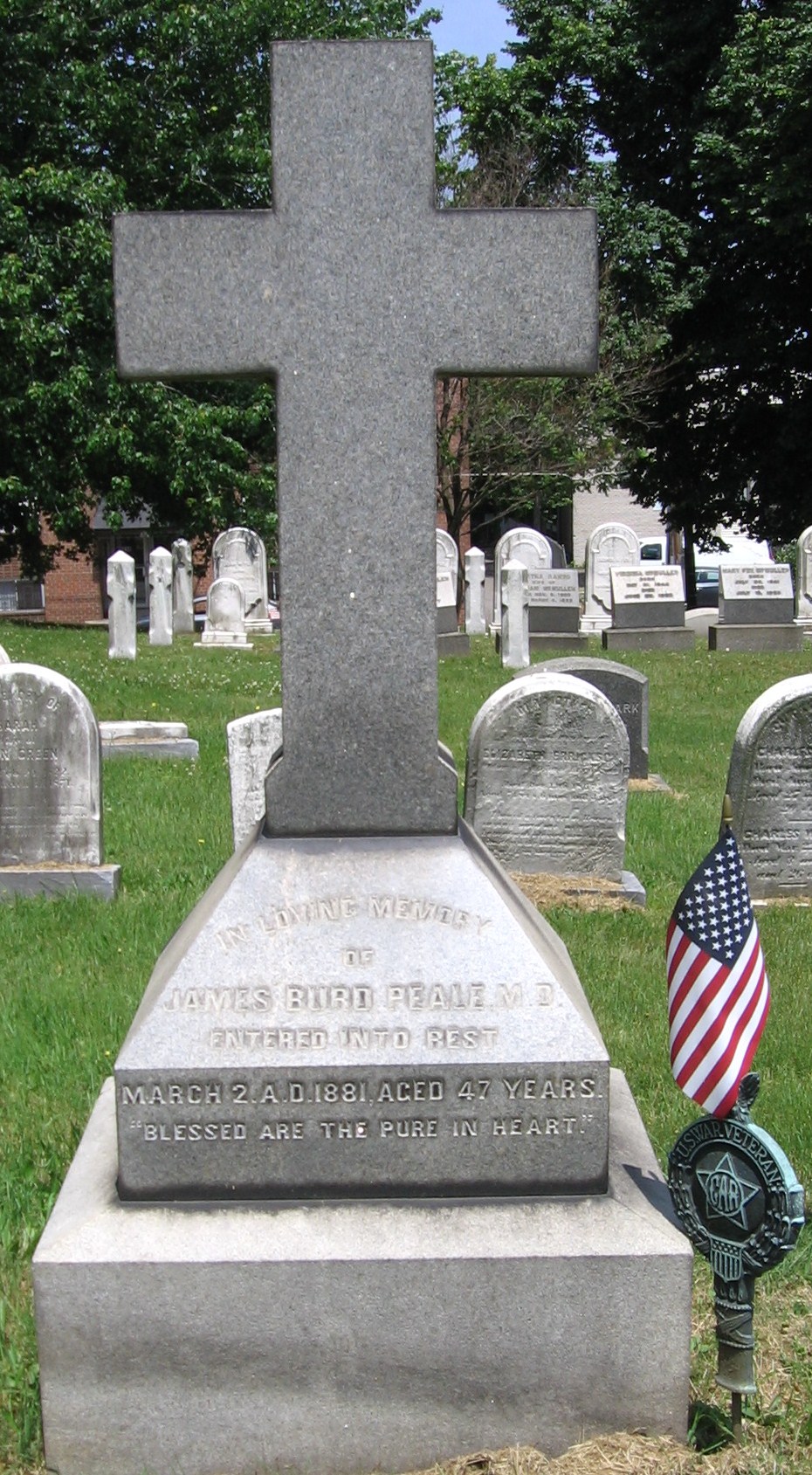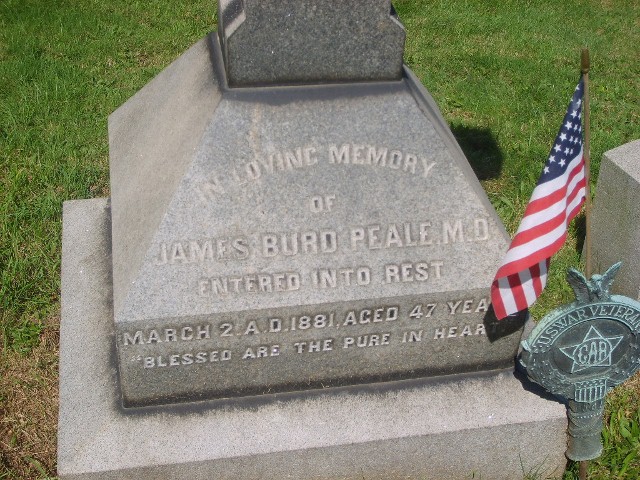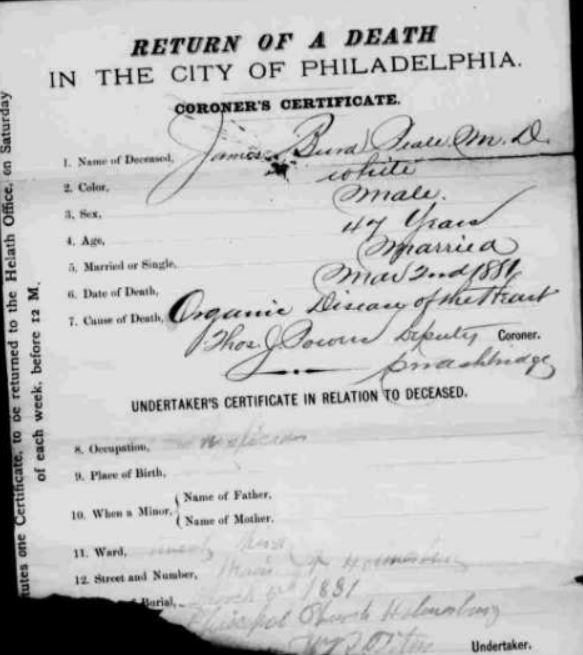He was married to Rebecca (MD) and was the father of Mary Burd, Elizabeth, Carrie and Ellen W Peale, all of Pennsylvania.
JAMES BURD PEALE, M. D. 1833-1881.
BY CHARLES K. MILLS, M. D.
Dr. James Burd Peale, the subject of this memoir, was born in New York City on the 10th of July, 1833. On the side of his father his ancestors were English; on that of his mother, Scotch-Irish. On both sides they held a distinguished place in the history of Pennsylvania and of Philadelphia. The name of Peale is one of the most prominent in the art history of our country, and of this city in particular. Dr. Peale was the fifth child and fourth son of Rubens Peale. His grandfather was Charles Wilson Peale, a distinguished artist, and colonel in the Revolutionary Army, who was born in Queen Anne County, Maryland, in 1741, and died in Philadelphia in 1827. Charles Wilson Peale was the founder of Peale's Museum. Rembrandt Peale was one of his sons. Artists of distinction have been known in the Peale family for several generations.
The mother of Dr. Peale was Eliza Patterson, the daughter of George Patterson and Jane Burd. Her paternal grandfather, Captain James Patterson, was a noted Indian fighter when Pennsylvania was a province. Her maternal grandfather, Colonel James Burd, was also prominent in the military history of central Pennsylvania in colonial times. Her maternal grandmother was Sarah Shippen, daughter of Edward Shippen, who was mayor of Philadelphia in 1744, and whose grandfather was the first mayor of Philadelphia in 1701.
Rubens Peale, the father of Dr. Peale, lived for a time in Baltimore, and also in New York, conducting the museum which had been removed from Philadelphia. Dr. Peale, as already stated, was born in New York. While yet a boy, his father removed to Schuylkill County, eventually settling on a farm six miles below Pottsville.
For several years Dr. Peale attended a private school at Pottsville. He entered upon the study of medicine with Dr. James Carpenter, one of Pennsylvania's most celebrated physicians, and formerly president of the Pennsylvania State Society. Dr. Peale doubtless owed much of his success as a practitioner to the instruction and example of his distinguished preceptor.
He matriculated in the Medical Department of the University of Pennsylvania, at which institution he graduated in March, 1856.
Shortly after graduation, he located in Reading, Pa., where he remained a short time. After leaving Reading he was in New York City for a few months. In 1859 he came to Holmesburg, Philadelphia County, where he was located during the rest of his life except the time spent in the army.
In 1860 Dr. Peale was married to Mary McBurnie, of Philadelphia, by whom he had two children, one of whom died in infancy; the other is still living. His wife died of phthisis in 1866. In 1868 he was married a second time to M. Rebecca Wilmer, of Maryland, a sister of Bishop Wilmer, of New Orleans. By this wife he had four children.
Dr. Peale's early career at Holmesburg was not without the incidents of toil and struggle so common in the history of a young practitioner of medicine. In two years, however, he had succeeded in laying the foundation of a fair practice, when the breaking out of the Civil War called him, for a time, to a new sphere of action. His army history was one of considerable brilliancy, and not without points of special interest. I will therefore take the liberty of giving a brief sketch of his military career, condensed from a volume compiled by Francis B. Wallace, and entitled "Memorials of the Patriotism of Schuylkill County, Pennsylvania."
Dr. Peale was commissioned as Brigade Surgeon October 30, 1861. On December 2, by Special Order 318, he was assigned to Department of Potomac, to duty on General Stahel's staff, First Brigade, Blenker's Division. December 12, 1861, he went into winter quarters at Hunter's Chapel, Virginia, until March 10,1862, when the advance toward Richmond took place. When Dr. Peale's Division reached Warrenton Junction, on the Orange and Alexandria Railroad, it was ordered to march by way of Ashby's Gap in the Blue Ridge, and Berry's Ferry over the Shenandoah River, to Strasburg. Failing to cross the river at that point, the division went to Snicker's Gap and Ferry, and thence through Berryville to Wood's Mills, four miles from Winchester. The sick of the division were sent thence to the Union Hotel, in Winchester. While at Wood's Mills, General Rosecranz took command of the division. The management of the hospital established in the Union Hotel not pleasing General Rosecranz, on the 4th of May he ordered Dr. Peale to "take charge of and organize as a Post Hospital" the Union Hotel Hospital. This was an exceedingly difficult duty. He succeeded, however, to the satisfaction of the proper authorities. While he was on this duty the division was marched by way of Romney to General Fremont's command, which it joined.
By May 23d the sick, left under Dr. Peale's charge, had all been sent away to the hospital at New Creek and back to their commands, except twelve, who were too ill to be removed. That night at eleven o'clock he learned that the enemy had attacked our forces at Front Royal on the Shenandoah, defeated them, and were approaching Winchester. Deeming it his duty to remain with those committed to his care, under any circumstances, Dr. Peale communicated his determination to do so to his assistant surgeon and to the few attendants remaining. They all expressed their intention of doing as he did. General Banks, having fallen back from Strasburg to Winchester, on the 24th of May, was attacked by Jackson's forces, and driven to and across the Potomac River. The sick who were able to walk from Strasburg, came into Dr. Peale's hospital on the evening of the 24th. About nine o'clock on the 25th, Dr. Peale was taken prisoner, and directed by the Rebels to continue attending the wounded as they were brought in by their (the Rebel) soldiers. Dr. Black, acting medical director of Jackson's forces, called upon him during the day, and informed him that he was to take charge of all the Federal sick and wounded, and organize a hospital in the same building he then occupied, the Union Hotel. All the wounded brought in, and all the sick from the three Union hospitals in Winchester, were then brought to the "Union Hotel" and placed under his care.
When the Rebels evacuated Winchester, Dr. Peale took charge of all the hospitals that had been occupied by them,— three in number,—and assigned surgeons from those who were assisting him, with assistants and necessary attendants, to each.
When General Banks occupied the place on the sixth day after the Rebels evacuated, approving of Dr. Peale's conduct, he granted him leave of absence for seven days to visit his family. June 19th, General Siegel being in command, by Special Order No. 81, Department Shenandoah, Section TV., Brigade-Surgeon J. B. Peale was appointed Chief of Hospitals, to carry out the provisions contained in " Sections 2 and 6 of General Orders No. 36, Adjutant-General's Office, Washington, April 7, 1862." Dr. Peale was at the second battle of Bull Run, August 30, 1862. About December 7, 1862, by Special Order No. 132, Headquarters Eleventh Army Corps, he was assigned to duty at headquarters as Medical Inspector of the Corps, on which duty he remained until his resignation was accepted, April 29th, in consequence of ill health, caused by exposure during the winter.
While on duty in Winchester as chief of hospitals, he organized a hospital in James M. Mason's house for the sick of Fremont's department, who were then in that city.
After leaving the army, Dr. Peale returned to Holmesburg, and, after a few years, built up a large and lucrative practice, which he retained until his death. He did most of his own surgical and gynecological work. He kept himself well posted in current medical literature. He was positive and self-reliant in character, and persevering in his methods. He took considerable interest in American archaeology. For several years before his death he was one of the directors of the Forrest Home for Aged and Infirm Actors.
Dr. Peale was a good husband and kind father. Devotedness to his family was one of his strongest characteristics. While a student of medicine he was confirmed in the Episcopal Church, and ever afterwards was a faithful, active and consistent member of the same. For more than twenty years he was affected with a disease of the valves of the heart. On the 2d of March, 1882, he suddenly expired while on a visit to the Forrest Home.
~Transactions, Volume 14; Medical Society of the State of Pennsylvania; 1832.
Obituary courtesy of Richard H. L. Chichester, III (#46953186)
He was married to Rebecca (MD) and was the father of Mary Burd, Elizabeth, Carrie and Ellen W Peale, all of Pennsylvania.
JAMES BURD PEALE, M. D. 1833-1881.
BY CHARLES K. MILLS, M. D.
Dr. James Burd Peale, the subject of this memoir, was born in New York City on the 10th of July, 1833. On the side of his father his ancestors were English; on that of his mother, Scotch-Irish. On both sides they held a distinguished place in the history of Pennsylvania and of Philadelphia. The name of Peale is one of the most prominent in the art history of our country, and of this city in particular. Dr. Peale was the fifth child and fourth son of Rubens Peale. His grandfather was Charles Wilson Peale, a distinguished artist, and colonel in the Revolutionary Army, who was born in Queen Anne County, Maryland, in 1741, and died in Philadelphia in 1827. Charles Wilson Peale was the founder of Peale's Museum. Rembrandt Peale was one of his sons. Artists of distinction have been known in the Peale family for several generations.
The mother of Dr. Peale was Eliza Patterson, the daughter of George Patterson and Jane Burd. Her paternal grandfather, Captain James Patterson, was a noted Indian fighter when Pennsylvania was a province. Her maternal grandfather, Colonel James Burd, was also prominent in the military history of central Pennsylvania in colonial times. Her maternal grandmother was Sarah Shippen, daughter of Edward Shippen, who was mayor of Philadelphia in 1744, and whose grandfather was the first mayor of Philadelphia in 1701.
Rubens Peale, the father of Dr. Peale, lived for a time in Baltimore, and also in New York, conducting the museum which had been removed from Philadelphia. Dr. Peale, as already stated, was born in New York. While yet a boy, his father removed to Schuylkill County, eventually settling on a farm six miles below Pottsville.
For several years Dr. Peale attended a private school at Pottsville. He entered upon the study of medicine with Dr. James Carpenter, one of Pennsylvania's most celebrated physicians, and formerly president of the Pennsylvania State Society. Dr. Peale doubtless owed much of his success as a practitioner to the instruction and example of his distinguished preceptor.
He matriculated in the Medical Department of the University of Pennsylvania, at which institution he graduated in March, 1856.
Shortly after graduation, he located in Reading, Pa., where he remained a short time. After leaving Reading he was in New York City for a few months. In 1859 he came to Holmesburg, Philadelphia County, where he was located during the rest of his life except the time spent in the army.
In 1860 Dr. Peale was married to Mary McBurnie, of Philadelphia, by whom he had two children, one of whom died in infancy; the other is still living. His wife died of phthisis in 1866. In 1868 he was married a second time to M. Rebecca Wilmer, of Maryland, a sister of Bishop Wilmer, of New Orleans. By this wife he had four children.
Dr. Peale's early career at Holmesburg was not without the incidents of toil and struggle so common in the history of a young practitioner of medicine. In two years, however, he had succeeded in laying the foundation of a fair practice, when the breaking out of the Civil War called him, for a time, to a new sphere of action. His army history was one of considerable brilliancy, and not without points of special interest. I will therefore take the liberty of giving a brief sketch of his military career, condensed from a volume compiled by Francis B. Wallace, and entitled "Memorials of the Patriotism of Schuylkill County, Pennsylvania."
Dr. Peale was commissioned as Brigade Surgeon October 30, 1861. On December 2, by Special Order 318, he was assigned to Department of Potomac, to duty on General Stahel's staff, First Brigade, Blenker's Division. December 12, 1861, he went into winter quarters at Hunter's Chapel, Virginia, until March 10,1862, when the advance toward Richmond took place. When Dr. Peale's Division reached Warrenton Junction, on the Orange and Alexandria Railroad, it was ordered to march by way of Ashby's Gap in the Blue Ridge, and Berry's Ferry over the Shenandoah River, to Strasburg. Failing to cross the river at that point, the division went to Snicker's Gap and Ferry, and thence through Berryville to Wood's Mills, four miles from Winchester. The sick of the division were sent thence to the Union Hotel, in Winchester. While at Wood's Mills, General Rosecranz took command of the division. The management of the hospital established in the Union Hotel not pleasing General Rosecranz, on the 4th of May he ordered Dr. Peale to "take charge of and organize as a Post Hospital" the Union Hotel Hospital. This was an exceedingly difficult duty. He succeeded, however, to the satisfaction of the proper authorities. While he was on this duty the division was marched by way of Romney to General Fremont's command, which it joined.
By May 23d the sick, left under Dr. Peale's charge, had all been sent away to the hospital at New Creek and back to their commands, except twelve, who were too ill to be removed. That night at eleven o'clock he learned that the enemy had attacked our forces at Front Royal on the Shenandoah, defeated them, and were approaching Winchester. Deeming it his duty to remain with those committed to his care, under any circumstances, Dr. Peale communicated his determination to do so to his assistant surgeon and to the few attendants remaining. They all expressed their intention of doing as he did. General Banks, having fallen back from Strasburg to Winchester, on the 24th of May, was attacked by Jackson's forces, and driven to and across the Potomac River. The sick who were able to walk from Strasburg, came into Dr. Peale's hospital on the evening of the 24th. About nine o'clock on the 25th, Dr. Peale was taken prisoner, and directed by the Rebels to continue attending the wounded as they were brought in by their (the Rebel) soldiers. Dr. Black, acting medical director of Jackson's forces, called upon him during the day, and informed him that he was to take charge of all the Federal sick and wounded, and organize a hospital in the same building he then occupied, the Union Hotel. All the wounded brought in, and all the sick from the three Union hospitals in Winchester, were then brought to the "Union Hotel" and placed under his care.
When the Rebels evacuated Winchester, Dr. Peale took charge of all the hospitals that had been occupied by them,— three in number,—and assigned surgeons from those who were assisting him, with assistants and necessary attendants, to each.
When General Banks occupied the place on the sixth day after the Rebels evacuated, approving of Dr. Peale's conduct, he granted him leave of absence for seven days to visit his family. June 19th, General Siegel being in command, by Special Order No. 81, Department Shenandoah, Section TV., Brigade-Surgeon J. B. Peale was appointed Chief of Hospitals, to carry out the provisions contained in " Sections 2 and 6 of General Orders No. 36, Adjutant-General's Office, Washington, April 7, 1862." Dr. Peale was at the second battle of Bull Run, August 30, 1862. About December 7, 1862, by Special Order No. 132, Headquarters Eleventh Army Corps, he was assigned to duty at headquarters as Medical Inspector of the Corps, on which duty he remained until his resignation was accepted, April 29th, in consequence of ill health, caused by exposure during the winter.
While on duty in Winchester as chief of hospitals, he organized a hospital in James M. Mason's house for the sick of Fremont's department, who were then in that city.
After leaving the army, Dr. Peale returned to Holmesburg, and, after a few years, built up a large and lucrative practice, which he retained until his death. He did most of his own surgical and gynecological work. He kept himself well posted in current medical literature. He was positive and self-reliant in character, and persevering in his methods. He took considerable interest in American archaeology. For several years before his death he was one of the directors of the Forrest Home for Aged and Infirm Actors.
Dr. Peale was a good husband and kind father. Devotedness to his family was one of his strongest characteristics. While a student of medicine he was confirmed in the Episcopal Church, and ever afterwards was a faithful, active and consistent member of the same. For more than twenty years he was affected with a disease of the valves of the heart. On the 2d of March, 1882, he suddenly expired while on a visit to the Forrest Home.
~Transactions, Volume 14; Medical Society of the State of Pennsylvania; 1832.
Obituary courtesy of Richard H. L. Chichester, III (#46953186)
Inscription
In Loving Memory of
Blessed are the Pure in Heart
Gravesite Details
Veteran GAR
Family Members
Advertisement
Explore more
Sponsored by Ancestry
Advertisement











